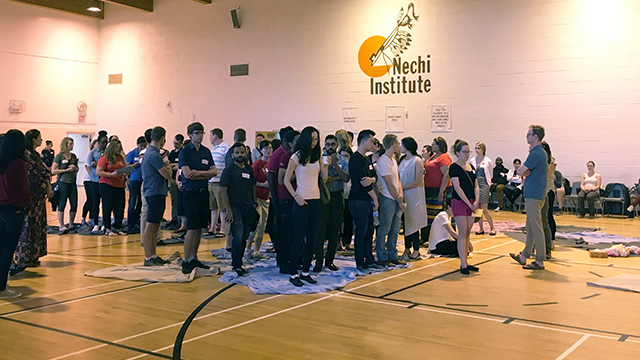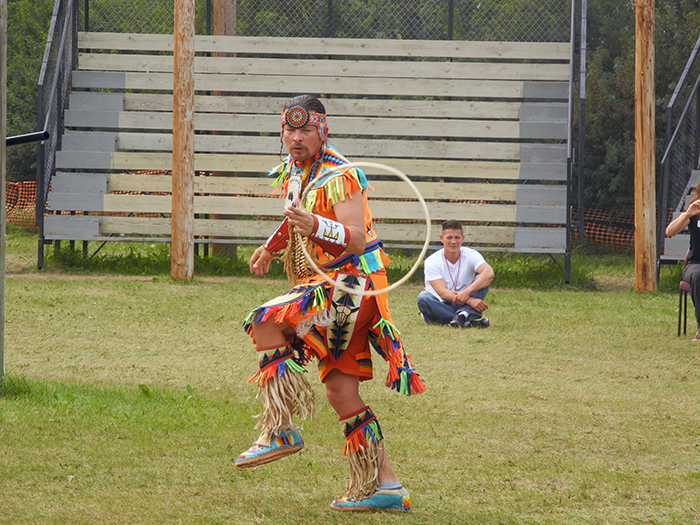
Residents participated in a KAIROS blanket exercise to understand the history of Indigenous peoples.
Medical residents shared an intensive day of learning about Indigenous culture, history and health on August 8, at the Indigenous Health Academic Day organized by the Faculty of Medicine & Dentistry's Department of Family Medicine.
The event, held for learners in the first and second year of the family medicine residency program, was the result of a partnership between the Department of Family Medicine, the Alberta Health Services Indigenous Wellness Program, the University of Alberta Indigenous Health Initiatives Program and Poundmaker's Lodge Treatment Centre. It took place at Poundmaker's Lodge, located at a site of a former residential school, where elders shared their vision and culture and had meaningful conversations with the residents.
"I feel incredibly blessed because it was not only a day of receiving information, but a true 'immersion' experience," said Danika Leung, second-year resident and part of the planning committee for the Academic Day. "We were exposed to solemn topics such as the history of Indigenous Peoples in Canada, and prejudice and barriers Indigenous patients face in our health-care system. This knowledge was not presented to us with a spirit of condemnation, but a spirit that welcomed partnership and reconciliation."
"A majority of the residents' encounters with Indigenous peoples prior to this day were in a medical setting, which could create a skewed picture of who Indigenous people are," said Cara Bablitz, co-organizer of the event and clinical lecturer in the Department of Family Medicine. "This day allows resident physicians to see the resilience and strength of our people at a site that is working towards Indigenous healing and wellness."
According to Bablitz, Indigenous people in Canada face infant mortality rates up to three times higher than other populations, higher incidence of diseases like diabetes, and a lower life expectancy. Initiatives from the faculty to increase awareness on these issues aim to improve health outcomes through education and development a lifelong relationship between Indigenous and non-Indigenous peoples.
"The literature has documented the many health inequities Indigenous peoples face, which lead to worse health status and outcomes," added Bablitz. "For meaningful change to occur, Indigenous health must be integrated into the training of every medical resident guided by the United Nations Declaration on the Rights on Indigenous Peoples and the Truth and Reconciliation Commission's Final Report and Calls to Action."

The day included a performance by renowned hoop dancer Dallas Arcand. (Photo: Danica Erickson)
The day was packed with activities meant to encourage reflection on how to improve health inequities for Indigenous populations. Indigenous physicians Josie Auger and Alika Lafontaine were guest speakers, increasing residents' awareness about the historical and cultural context lived by Indigenous peoples-including the long-term impact of residential schools.
The speakers explained the importance of medical residents being aware of and understanding the cultural and spiritual practices of their Indigenous patients and how they relate to the care they are providing. "Some residents noted that they gained a better understanding of the importance of tobacco in the Indigenous culture-how it is not simply a substance, but a symbol of opening the door for relationship," explained Leung. "As a result, we will be more culturally sensitive about how we address this topic in our future interactions with Indigenous patients."
During his presentation, Lafontaine used real-life cases that evidenced the struggle from Indigenous people to obtain the appropriate care they needed. He raised awareness on possible "unintentional blind spots" physicians may need to overcome, reminding residents that "there is a world out there we don't see."
In addition to listening to speakers, the future family doctors also had the opportunity to tour the Poundmaker's Lodge facilities, enjoy a traditional meal and entertainment, and take part in a round dance. They also participated in a blanket exercise, helping residents visualize a timeline of the history of colonization of Indigenous populations.
Leung also highlighted the rich experience of learning from Indigenous peoples, instead of just about them and says she hopes all medical residents have the opportunity to experience an Indigenous Health Academic Day.